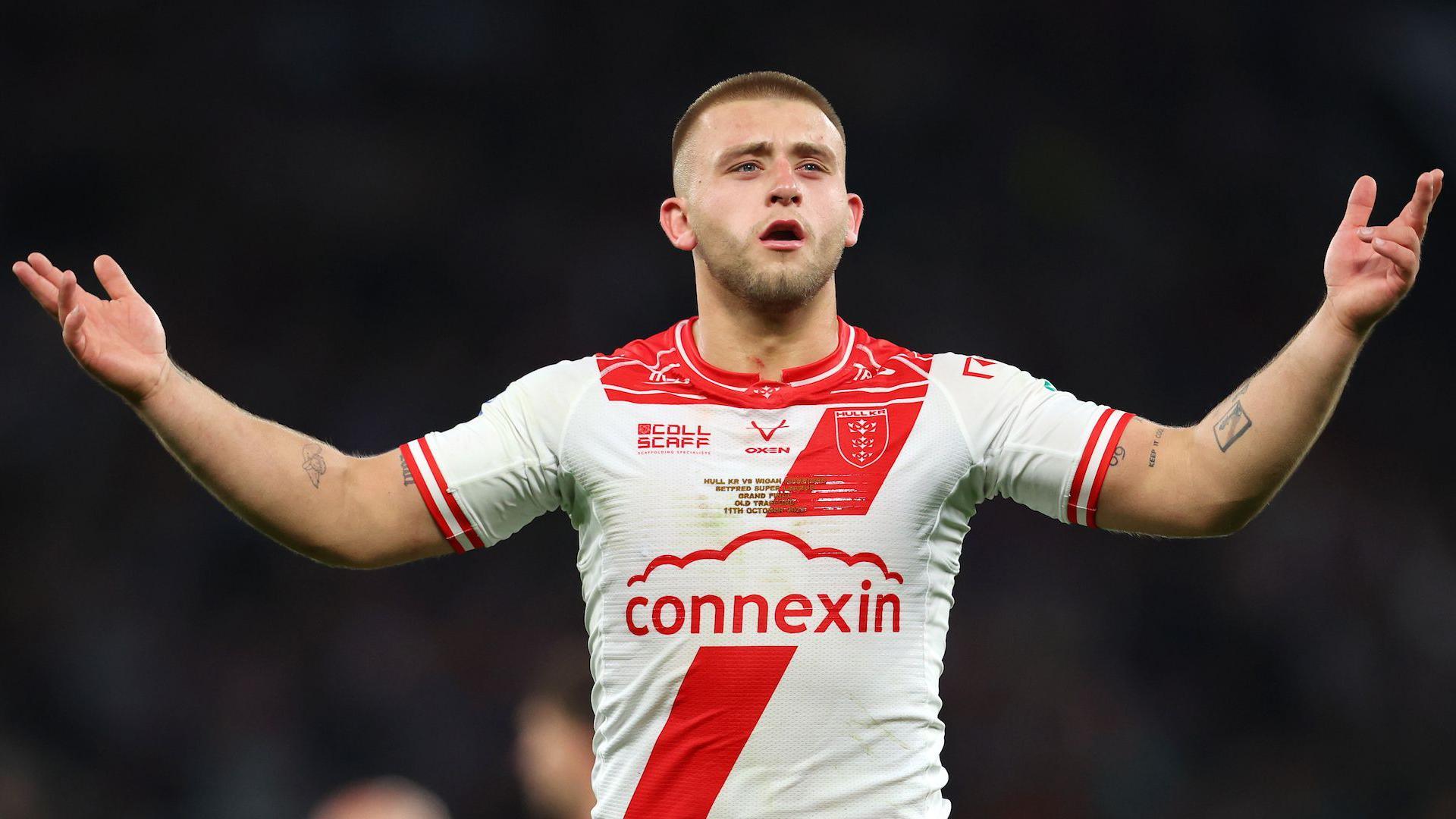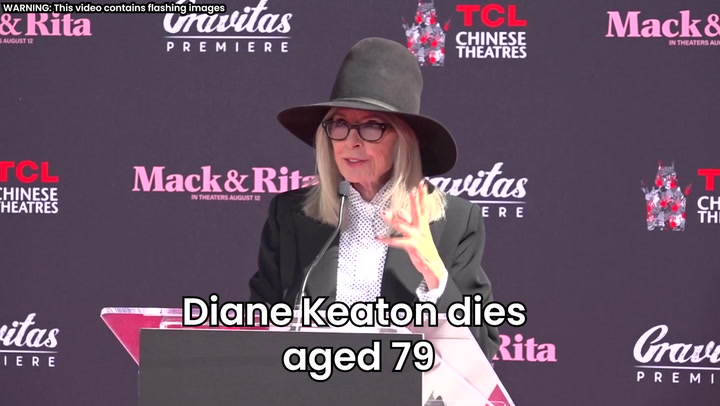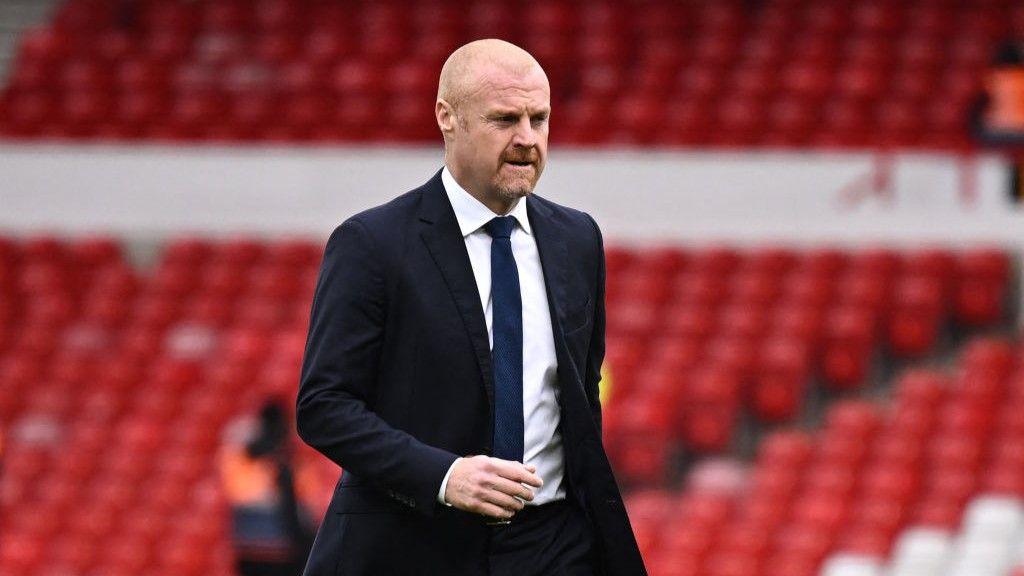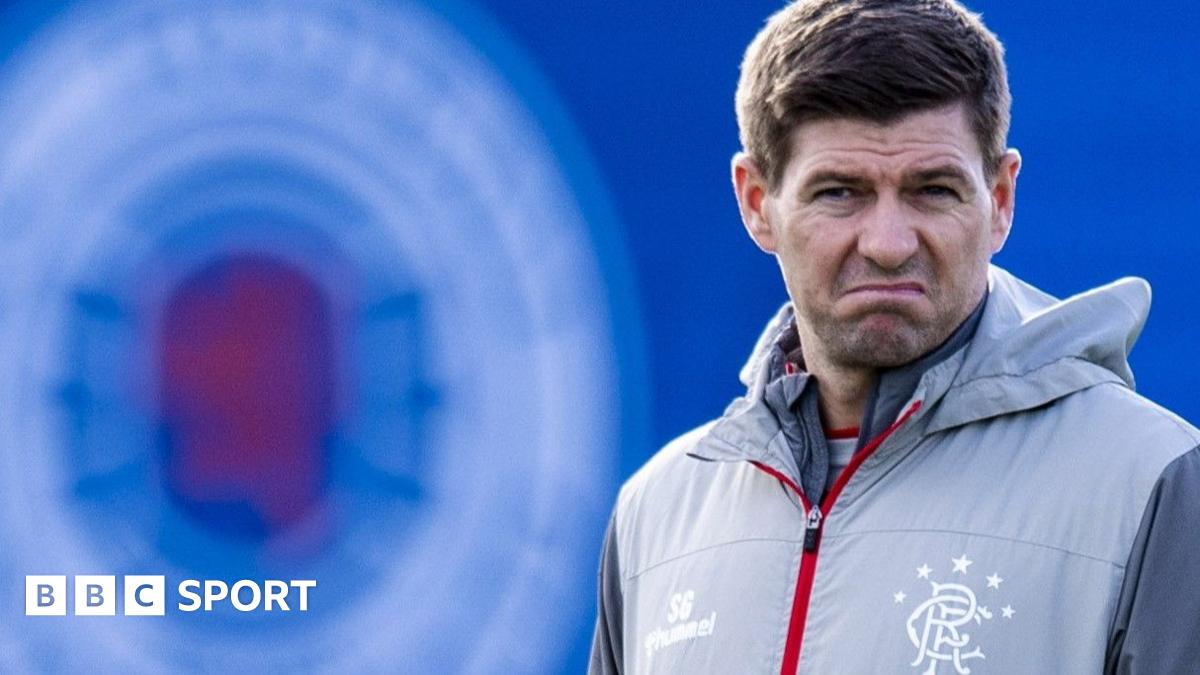To play this video you need to enable JavaScript in your browser.
- 575 Comments
Betfred Super League Grand Final
Hull KR (10) 24
Tries: Lewis, Burgess 2, Litten Goals: Mourgue, Martin 3
Wigan (2) 6
Hull KR became only the fifth team to win a Super League Grand Final as they put in a stunning performance to beat Wigan Warriors at Old Trafford and complete the treble.
Only Bradford Bulls, Leeds Rhinos, St Helens and their opponents Wigan had won a Grand Final before this breakthrough moment, in which Hull KR ensured they would add a third trophy to their 2025 locker, having already won the Challenge Cup and League Leaders’ Shield.
Brad O’Neill’s first-half yellow card for a tip tackle on Tyrone May proved decisive, with Mikey Lewis and Joe Burgess running in while the Cherry and Whites were depleted.
Despite their commanding performance, it was Wigan – who had won the domestic treble themselves and the World Club Challenge in 2024 – who almost edged in front early on when Bevan French put in a defence-carving run to go in from Liam Marshall’s kick, but replays showed he dropped the ball before grounding.
A tempestuous opening, which had previously seen Jared Waerea-Hargreaves go in hard on French, came to a head when Wigan had O’Neill sent to the bin for his wayward tackle on May for which he was lucky not to see red.
And Hull KR wasted no time in making their advantage count as Lewis sold a sumptuous dummy to run in with ease right in front of Wigan’s supporters at the Stretford End for his 21st try of the season.
O’Neill’s yellow card became even more costly soon after as Hull KR worked the ball wide to Burgess, who touched down at the corner.
Wigan ended the first half with two points on the board after Adam Keighran’s audacious long-range penalty goal and, in much the same manner as Lewis’ first-half score, Jai Field sold a tremendous dummy to send Harry Smith through.
- 2 hours ago
- 1 hour ago
Hull KR rise to occasion in triumphant display
Whereas the 2024 final between these two sides was a tense and a low-scoring affair, Hull KR flipped that script on its head with this year’s war of attrition.
Gone was the caginess of last year. And nerves? What nerves? This was a side made for the occasion, that knew they were on the cusp of greatness and took their opportunity.
Yet it might not have been that way as they were off the pace in the opening stages, and were lucky not to fall behind when they failed to pick up French on the turnover prior to his score being chalked off.
Other than that if they seemed unnerved by the occasion, knowing they were 80 minutes from a history-making treble, they did not seem to show it.
Much had been said in the build-up to the game about Hull KR’s recent and distant past – whether that is relegation in the Million Pound Game in 2016 or finishing bottom of Super League in 2020.
Indeed, outside of some second-tier honours, you had to go back 40 years to the last time the Robins reigned supreme.
Bolstered by the retiring Waerea-Hargreaves – who almost missed the game through suspension prior to KR’s successful appeal this week – and Micky McIlorum, they soon carved open Wigan and never looked back.
Robins talisman Lewis has gone from strength to strength in recent seasons but, much like his team, this feels like the moment in his career where he truly came alive.
But this was a team performance. It was not won by individual moments of brilliance.
It was a display befitting a treble-winning side and masterminded by an elite coach in Willie Peters.
Off-colour Wigan go trophyless for first time under Peet

From the glory of grabbing everything they could in 2024, Wigan’s 2025 campaign ended without a trophy.
Hull KR have long been the consistent side this term and they underlined that during this Grand Final.
Wigan, despite having the pairing of French and Field and a matchday squad of 15 players from last season’s final, could not match the dominance of their rivals and the Matt Peet era had its first trophyless season as a result.
But this was an uncharacteristically poor Wigan display and, outside of a promising opening 10 minutes, they rarely looked like gaining a decisive foothold in the game.
Since Peet arrived in 2022, Wigan have seemingly played level-headed rugby which has paid off – resulting in trophies galore.
Yet they seemed unable to deal with Hull KR’s combative gameplan and heavy hitting, which proved O’Neill’s – and Wigan’s – downfall in a poor first-half showing.
Putting the blame solely at their door would be unfair to Hull KR, who executed their tactics to perfection and looked sensational in possession, attack and, for the most part, defence.
- 4 hours ago

‘We dodged two bullets’ – reaction
Hull KR head coach Willie Peters speaking to BBC Radio 5 Live:
“I’m so proud. Regardless of the result I would have been proud but we’ve gone to another level after that performance.
“We had to fight tooth and nail, we knew that Wigan were going to come back, they’re a champion team so we had to fight but there’s a lot of fight in our team.
“I said at half-time that we had a nervous start and Mikey [Lewis] sort of corrected me, he said he had an excited start, we were too excited and he was right.
“The players were ready but over-excited. Once we started completing some sets then we started to find our groove a little bit and they settled.
Hull KR captain Elliot Minchella speaking to BBC Radio5 Live:
“I don’t think we started the game great, it was pretty nervous and we were over-trying. The big stage can make you do that, and we dodged two bullets.
“If they scored the two tries, then the game looks pretty different – so we were probably lucky in those 20 minutes. But after that we found our groove and settled down.
Wigan Warriors head coach Matt Peet speaking to BBC Radio 5 Live:
“I’m proud of the team. Hull KR deserve to win and the night belongs to them. Sometimes I think these things are written in the stars and this season belongs to them.
“They’ve worked so hard as a club, as a playing group, the coaching staff. There are things that we’ll look back and rue but it’s different tonight when your’re in the moment.
“We missed a few opportunities early on and I did wonder if that would come back to bite us but I love my team, proud of them and Hull KR deserve all their success.
Hull KR: Mourgue; Davies, Hiku, Gildart, Burgess; Lewis, May; Sue, McIlorum, Waerea-Hargreaves, Hadley, Batchelor, Minchella
Interchanges: Litten, Luckley, Whitbread, Martin.
Wigan: Field; Miski, Keighran, Wardle, Marshall; French, Smith; Byrne, O’Neill, Thompson, Walters, Farrell, Ellis.
Interchanges: Harvard, Nsemba, Mago, Leeming.
Related topics
- Hull Kingston Rovers
- Rugby League
- Wigan Warriors










